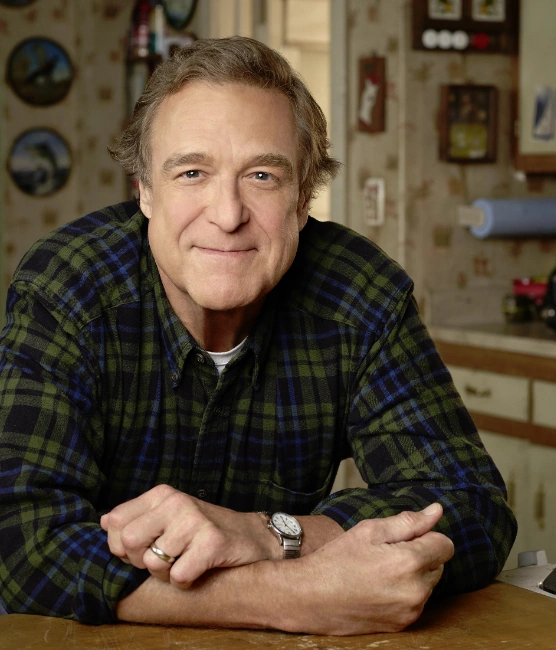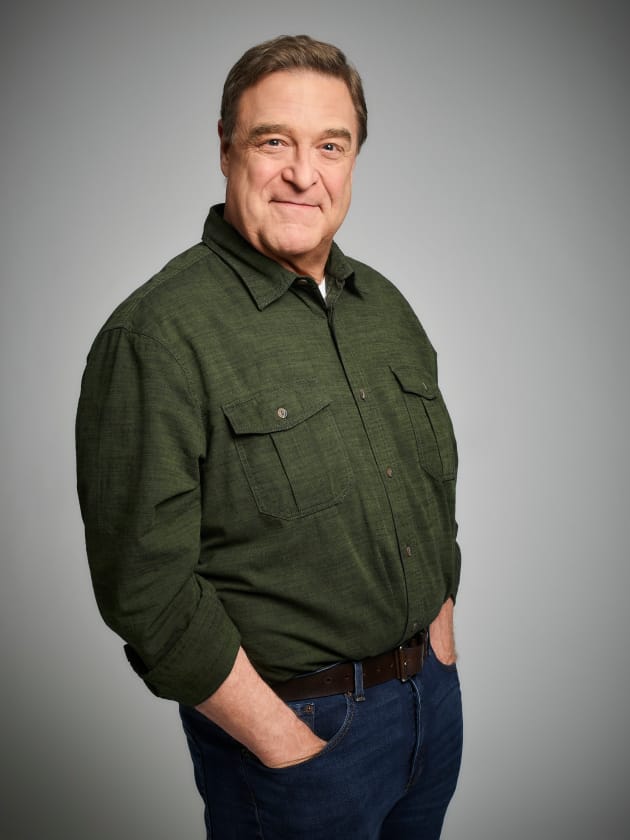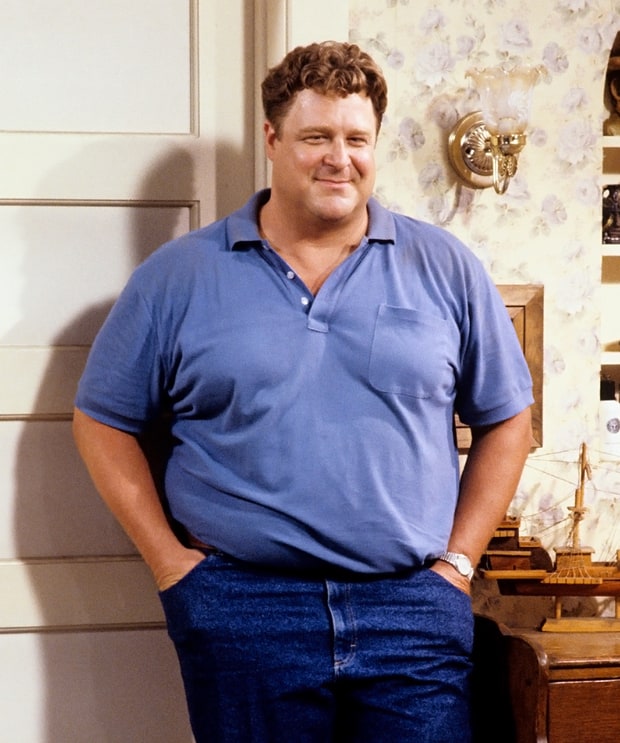Can a single television character truly capture the essence of a generation? Absolutely. Dan Conner, brought to life by the brilliant John Goodman in the groundbreaking sitcom Roseanne, did precisely that. The show, which first graced television screens in 1988, wasn't just a hit; it was a cultural phenomenon, and at its heart was a man who, despite his flaws, represented the hopes, the hardships, and the unwavering spirit of the American working class.
Dan Conner wasn't a superhero or a silver-tongued charmer. He was a contractor, a husband, a father, and a man grappling with the realities of making a living and raising a family in a changing world. He navigated the everyday trials of job insecurity, financial pressures, and the constant demands of family life with a mixture of humor, grit, and a deep, abiding love. His character development unfolded across the seasons, mirroring the evolution of American society and providing a voice for millions who found themselves reflected in the Conners' kitchen.
| Full Name | Daniel "Dan" Conner |
| Portrayed by | John Goodman |
| Date of Birth (In-Show) | Unspecified, but presumably late 1940s or early 1950s |
| First Appearance | Roseanne (1988) - Pilot Episode |
| Occupation | Contractor (various jobs including construction, auto repair) |
| Spouse | Roseanne Conner (ne Harris) |
| Children | Becky Conner-Healy, Darlene Conner-Healy, David Healy, Jerry Garcia Conner (later retconned) |
| Residence | Lanford, Illinois |
| Notable Traits | Hardworking, supportive, humorous, resilient, loving, flawed, loyal. |
For further information, you can explore his character on the Roseanne Wiki: Dan Conner on Roseanne Wiki
- Dakota Brinkman Rising Star Son Of Melissa Gilbert Uncovered
- Jmes Net Worth 2024 How The Grime Legend Built His Empire
Dan's persona was built on several key traits that resonated deeply with viewers. He was, first and foremost, a tireless worker. He wasn't afraid to get his hands dirty, taking on physically demanding jobs to provide for his family. Whether it was framing houses, fixing cars, or whatever else he could find, Dan's dedication to his work was a constant demonstration of his commitment. He understood the value of hard work, not just in terms of financial security, but also in the sense of pride and self-respect it provided.
Beyond his work ethic, Dan was a pillar of support. He stood by his wife, Roseanne, through thick and thin, offering a shoulder to lean on and a listening ear. He championed his children's dreams, even when they were unconventional. He was, in essence, the rock of the Conner family, providing stability and a sense of belonging. His support wasn't always expressed with grand gestures; often, it was the quiet presence, the knowing glance, or the subtle act of kindness that spoke volumes.
Dan also possessed a remarkable sense of humor. His quick wit, his ability to find the funny side of even the most stressful situations, was a crucial element of the show's appeal. He used humor not just to lighten the mood but also to connect with his family and to cope with the challenges they faced. His comedic timing was impeccable, adding levity to the show's more serious themes and ensuring that Roseanne remained both relatable and entertaining.
But perhaps the most defining trait of Dan Conner was his resilience. Life wasn't easy for the Conners. They faced financial struggles, job losses, and the everyday pressures of raising children. Yet, through it all, Dan refused to give up. He kept fighting, kept working, and kept loving his family. He embodied the spirit of perseverance, showing viewers that it was possible to overcome adversity with a little bit of grit and a whole lot of heart. This resilience made him not just a character on television, but a role model for many who watched.
The heart of Roseanne was undeniably the relationship between Dan and Roseanne. Their marriage was far from perfect; it was a partnership forged in the crucible of shared experiences, mutual respect, and a deep, abiding love. Their dynamic was a refreshing departure from the often-idealized portrayals of marriage on television. They argued, they disagreed, and they sometimes drove each other crazy, but they always found their way back to each other. Their connection was built on a foundation of unwavering support and a shared understanding of the challenges they faced. They were partners in life, navigating the ups and downs together, and their relationship provided the emotional core of the entire series.
Their relationship was a true partnership, they shared responsibilities and challenges of working-class America. They were not afraid to show their imperfections, struggles, and disagreements, reflecting the reality of long-term relationships and how to go through all phases of life together.
Dan's interactions with his children further enriched the narrative. His relationships with Becky, Darlene, and (later) D.J. were complex and nuanced. He was a loving father, but he also understood the importance of discipline and the need to allow his children to grow and make their own choices. He wasn't afraid to challenge them, to push them to be better, but he always did so with love and a desire to see them succeed. His role as a father reflected the changing landscape of parenting, balancing traditional values with a more modern understanding of raising children.
The Conners' family dynamic were the heart and soul of the show, showcasing the essence of modern family life. The struggles, triumphs, and laughter of the Conner family provided authentic stories and relatable moments.
Dan's career as a contractor served as a microcosm of the economic realities faced by many working-class families. His job security was often precarious. He faced the constant pressure of finding work, of dealing with fluctuations in the construction industry, and of providing for his family in an uncertain economic climate. These struggles were not just plot devices; they were a reflection of the real-world challenges faced by millions of Americans. Through Dan's experiences, the show offered a glimpse into the lives of those who often felt marginalized by mainstream media.
His career was also a source of both frustration and pride. Dan took genuine satisfaction in his work, in the tangible results of his labor. He enjoyed the sense of accomplishment that came from building something with his own hands. This passion for his work provided a sense of purpose and identity, even when faced with the inevitable setbacks and challenges of the construction business. His job-related issues provided a narrative thread that spoke to the daily grind and the economic uncertainty that defined many American households.
The cultural significance of Dan Conner lies in his authentic representation of the American working-class father. He wasn't a caricature or a stereotype; he was a fully realized character with depth, flaws, and a genuine heart. His relatability stemmed from his ability to reflect the experiences of everyday people, providing a voice to those who often felt unheard. Dan's portrayal helped shatter stereotypes and offer a more complex view of family dynamics and the American Dream.
His role was a significant step forward in the portrayal of families on television. The focus on the working class and the issues they faced made him a symbol of representation and inclusion. He contributed to the conversations about diversity in media and society.
The legacy of Dan Conner has influenced the depiction of fathers in subsequent television shows. The character paved the way for a more realistic, multifaceted portrayal of fatherhood. His authenticity and the vulnerability made him a model for subsequent shows and movies.
Dan's character had a profound impact on the audience. Viewers connected with his honesty and the way he handled the hardships of daily life. His resilience, humor, and love for his family touched the lives of millions. His persona provided a sense of connection for many who watched him grow in life.
The character of Dan Conner served as a symbol of hope and determination, especially for working families. His ability to overcome challenges inspired audiences to face their struggles. He became a symbol of resilience for his viewers.
The creation of Dan Conner was a collaborative effort involving writers, producers, and John Goodman himself. The character was not born fully formed but evolved organically over the course of the series. The writers and producers listened to audience feedback, incorporating elements that resonated with viewers and adjusting the character to reflect the changing times.
John Goodman's performance was the cornerstone of Dan's success. Goodman brought a level of authenticity and depth to the role that transformed Dan from a character on a script into a living, breathing human being. His ability to convey a wide range of emotions, from humor and warmth to frustration and vulnerability, was crucial to the character's enduring appeal. His casting and the decisions made regarding his character were central to the success of the entire series.
The shows storylines and direction contributed to shaping Dans character. The various decisions made by the writers and actors had a pivotal impact on Dan's overall portrayal. The choice to address pressing societal issues highlighted Dan's qualities and gave him a sense of depth that resonated with viewers.
In many ways, the character of Dan Conner remains a timeless and relevant figure. His representation of the American working class, his commitment to family, and his unwavering spirit continue to resonate with audiences. His character has become a symbol of resilience and determination for many families.
The legacy of Dan Conner and the impact of Roseanne is vast. His portrayal of the everyday struggles, the joys, and the unbreakable bonds of family, continue to inspire. Dan's story is a reminder of the power of laughter, the importance of perseverance, and the enduring strength of the human spirit.
- Justin Bieber News Latest Updates Whats Next
- Jesse Metcalfe From Desperate Housewives To Today A Deep Dive


